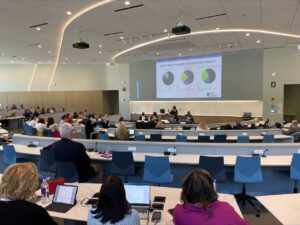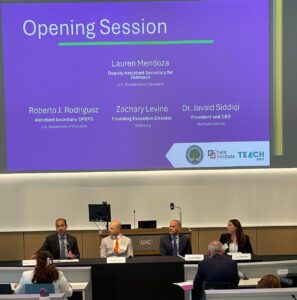

July 17, 2024
Authors: Dr. Javaid Siddiqi, President & CEO, The Hunt Institute; Jarvis Lundy, Director of Educator Diversity, The Hunt Institute
Our nation’s education system is at an inflection point. With unprecedented drops in student achievement, staffing challenges in districts across the country, and shifting demographics in public schools, it is becoming increasingly important that teachers and school leaders reflect the racial, ethnic, and cultural diversity of the students they serve. Currently, 54 percent of public school students are students of color, while only 22 percent of teachers and 20 percent of principals are people of color. Research shows that diverse teachers benefit all students, and students of color with teachers who share their race or ethnicity are less likely to be suspended and more likely to graduate high school, enroll in college, and earn a degree. Yet, 40% of our schools nationwide do not have a single educator of color.
The Hunt Institute is committed to being part of the solution to addressing the underrepresentation of teachers and leaders of color in our nation’s schools. Through our work with the One Million Teachers of Color (1MToC) campaign, in partnership with seven aligned organizations, we aim to add one million teachers and thirty thousand leaders of color to the education workforce by 2030. We recognize that to achieve these lofty goals, the perception of the teaching profession needs to change, as does the understanding of the importance of a diversified educator workforce. This recognition was clearly illustrated by our annual Across the Aisle survey, in partnership with the Honorable Bob Wise (Governor, West Virginia, 2001-2005, and U.S. House of Representatives, 1983-2001) and Lake Area Research, which surveyed a bipartisan group of likely voters, including parents across the nation on a variety of education issues. Despite this data, less than a quarter of voters consider educator diversity an issue of concern.
As a nation, we must shift the perception of the importance of diversifying the educator workforce. To do this, The Hunt Institute, on behalf of the One Million Teachers of Color campaign, partnered with The U.S. Department of Education and TEACH.org to launch a PSA to reshape the perception of the teaching profession and the importance of educator diversity.
Educator diversity is a bipartisan issue and a shared responsibility that demands collaboration from stakeholders across the education spectrum.

In a dedicated effort to advance the work of the PSA campaign and in continued partnership with the U.S. Department of Education and TEACH.org, The Hunt Institute recently orchestrated an ambitious series of three Regional Convenings in just three weeks across the nation. The Regional Convenings to Mobilize State Action to Advance the Teaching Profession, a significant milestone, kicked off by bringing states from the West to Albuquerque, New Mexico, on May 30 and 31, followed by Midwest and Northeast states in Chicago, Illinois, on June 13 and 14, and finally with Southern states coming to Jackson, Mississippi, on June 20 and 21. These events were crucial platforms to bolster state actions related to teacher compensation, high-quality, affordable pathways to the educator profession, and, ultimately, to enhance educator diversity. The three convenings galvanized a total of 25 state teams comprised of state legislators and educator leaders, marking a pivotal moment in the ongoing dialogue about improving the teaching profession across the United States.
 The three Regional Convenings aimed to foster collaboration among states and key stakeholders, including state leaders, elected officials, college and university administrators, teacher union leaders, and others. These events featured extensive collaboration time, focusing on sharing successful policies and brainstorming solutions to pressing challenges. Each session began with expert presentations, followed by state teams showcasing the progress of promising policies in advancing teacher compensation, affordable pathways into teaching, and educator diversity. Engaging panel discussions provided in-depth conversations and actionable insights. With facilitation from The Hunt Institute staff and content experts and nearly five hours of structured collaboration time at each convening, states had the opportunity to strategize on issues like budget constraints, teacher retention, and educator diversity. Of all topics discussed, the importance of educator diversity was routinely at the forefront across state teams.
The three Regional Convenings aimed to foster collaboration among states and key stakeholders, including state leaders, elected officials, college and university administrators, teacher union leaders, and others. These events featured extensive collaboration time, focusing on sharing successful policies and brainstorming solutions to pressing challenges. Each session began with expert presentations, followed by state teams showcasing the progress of promising policies in advancing teacher compensation, affordable pathways into teaching, and educator diversity. Engaging panel discussions provided in-depth conversations and actionable insights. With facilitation from The Hunt Institute staff and content experts and nearly five hours of structured collaboration time at each convening, states had the opportunity to strategize on issues like budget constraints, teacher retention, and educator diversity. Of all topics discussed, the importance of educator diversity was routinely at the forefront across state teams.

As the Regional Convenings have concluded, the focus now shifts to capitalizing on the momentum generated by working with half the nation’s states. The Hunt Institute is committed to continuing its engagement with participating states, providing ongoing support to further their initiatives in these critical areas. By maintaining this collaborative momentum, our nation can make significant strides toward creating a more equitable, rewarding, and diverse education profession.

The three convenings have facilitated invaluable dialogue and laid the groundwork for tangible action. By harnessing the collective expertise and dedication of state leaders and stakeholders, these events have set a promising precedent for future convenings. Your support is crucial to The Hunt Institute’s efforts to make educator diversity a kitchen table issue nationwide and ensure that our education workforce more closely reflects our country’s student population. Join the One Million Teachers of Color campaign here and share this PSA to make a difference.
“The success of our students is measured in part by how well we prepare, grow and support a great teacher for every classroom. Addressing educator shortages is one of the most urgent challenges we have to tackle in public education. The Department has advanced an ambitious policy agenda, including investing nearly $2.7 billion this year, to prepare and support America’s teachers and tackle the teacher shortage. State officials and leaders from across the country are joining in, leading the way, and demonstrating what’s possible to meet this charge. We will continue to support all states and districts as they design, advance, and implement their plans to ensure that all children have access to diverse and talented teachers in their schools.” – Roberto J. Rodríguez, Assistant Secretary, Office of Planning, Evaluation, and Policy Development, U.S. Department of Education